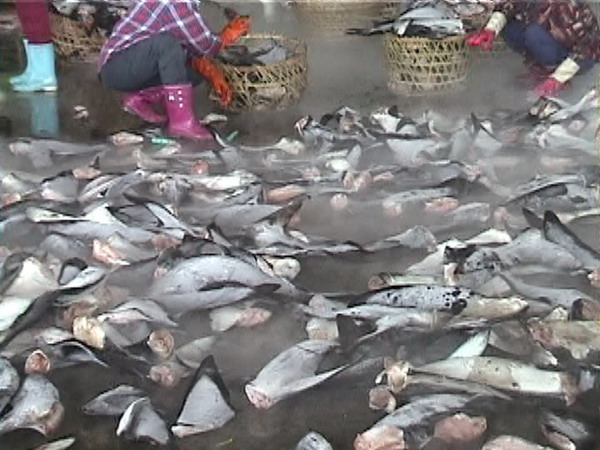Major convenience store chains vow to drop shark fin for a more

Taiwan’s four largest convenience store chains have dropped shark fin from their Lunar New Year menus.
The move came in response to a collective appeal by Environment & Animal Society of Taiwan (EAST) and 22 other NGOs last year, urging the chains to abandon the product.
The appeal garnered overwhelming support from members of the public. Many responded by signing an online petition urging the chains to “Say No to Shark Fin” and writing to business owners to demand a ban on dishes containing shark fin.
EAST confirmed that 7-ELEVEN, FamilyMart, Hi-Life and OK Mart have completely phased out shark fin dishes after reviewing their Lunar New Year menu offerings.
While two dishes apparently using shark fin initially appeared on Hi-Life’s pre-order catalog, the chain’s public relations director clarified that the dishes featured imitation shark fin, not real fins. Hi-Life had already instructed their suppliers not to use real shark fin and had simply overlooked the catalogue error, the chain said.
“Shark finning remains a common practice in many countries ‒ Taiwan included ‒ in which fishers slice off a shark’s fin and dump the rest of the still-live body back into the ocean. No longer able to swim, these finless sharks suffer a painful death through blood loss or asphyxiation, or are eaten alive by other sharks. We therefore view shark fin consumption as a cruel practice that severely threatens the shark populations” said Yu-Min Chen, Deputy Chief Executive of EAST.
Because sharks sit at the top of the marine food chain they are more susceptible to the bioaccumulation of marine pollutants that are harmful to human health. A 2008 Hong Kong survey revealed that most shark fins contained dangerously high levels of toxic mercury. In addition, it is common practice to use industrial grade hydrogen peroxide as a bleaching agent in the processing of shark fins. These toxins and heavy metals cannot be removed by cooking.
“Shark fin consumptions poses a serious risk to human health. We strongly encourage the public to stop consuming shark fins to ensure a healthy future for themselves and our planet” said Ms. Chen.
***
Hong Kong: In response to criticism from conservation groups, Hong Kong Disneyland, decided to pull shark fin dishes from its menus when it opened in 2005.
Malaysia: In 2007, Malaysia's Natural Resources and Environment Ministry struck shark fin soup from menus at official functions to help conserve shark species.
Palau: On September 25, 2009, Palau announced a plan to create the world’s first “shark sanctuary” to protect endangered shark species, banning all commercial shark fishing within its 600,000 square kilometres of territorial waters.
Maldives: In March 2010, the Maldives announced a shark fishing ban which turned its 90,000 square kilometers of territorial waters into a shark sanctuary.
United States: In late May 2010, the Hawaii State Legislature passed a bill that prohibits the possession, sale, trade, or distribution of shark fins without a permit issued by the Hawaii Department of Land and Natural Resources for shark research or educational purposes, or the Hawaii Department of Health for restaurants offering shark fins for consumption by July 1, 2010. Effective July 1, 2011, it will be illegal for these restaurants or retailers to sell or possess fins for shark-fin soup or other shark fin products.
On January 4 2011, President Barack Obama signed the Shark Conservation Act into law. The Act prohibits any person from possessing, transferring or landing shark fins (including tail fins) that are not "naturally attached to the corresponding carcass", and from landing a shark carcass without its fins "naturally attached". In addition, the package amended the High Seas Driftnet Fishing Moratorium Protection Act, requiring the US Secretary of Commerce to identify nations without similar protections and place them on a watch list.
***
In addition to its status as one of the world's largest shark fin consumers, Taiwan is also a major shark-catching country and shark fin exporter. According to the official statistics from Hong Kong – the center of the global shark fin trade – about 9,950 tons of shark fins (including dried shark fins and frozen shark fins) were imported into Hong Kong in the year 2008. Among the major source countries, Spain topped the list with a total supply of 2,646 tons, followed by Singapore (1,201 tons) and Taiwan in third place (991 tons).
Taiwan’s laws currently only protect whale sharks – the capture, sale, import and export of whale shark products is prohibited – and are yet to ban the inhumane practice of shark finning.
Under Taiwan’s fisheries laws, shark “bodies and fins must be landed at the same time” and “the weight of fins should not be more than 5% of the weight of the total catch,” as stipulated by the regulations of Regional Fisheries Management Organizations (RFMOs).
As the world’s shark populations suffer the consequences of Taiwan’s legal lacuna, EAST urges the government to take serious action to contribute to global shark conservation efforts.
Translated by Vivian Lau










